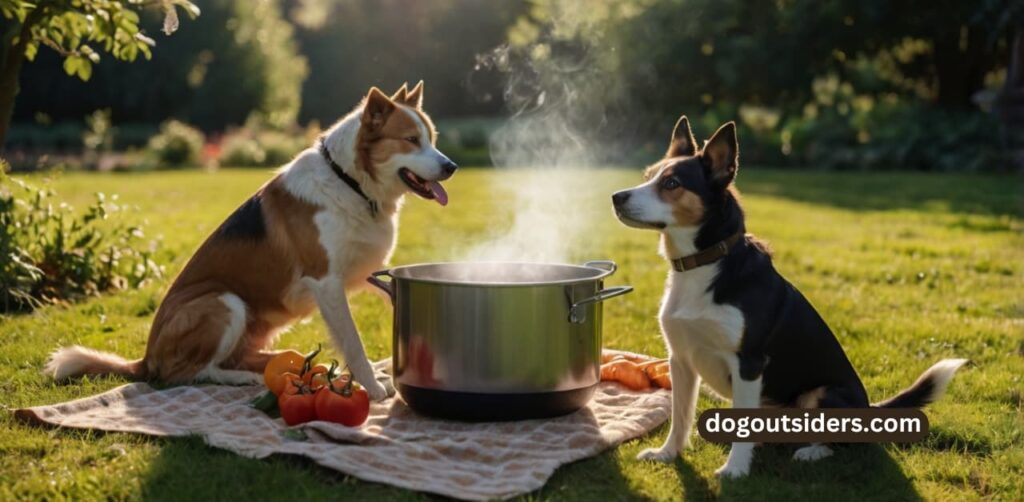Curious to know whether dogs can have vegetable broth. Vegetable broth is a rich liquid made with vegetables, usually carrots, celery, and onions. If you’re making vegetable broth for your dog, it’s important to understand what ingredients are safe. Dogs can safely eat vegetable broth, just be cognizant of dangerous ingredients such as onions and garlic. This easy homemade broth can provide extra hydration and flavor. I’m prepared to answer frequently asked questions about dogs and vegetable broth. Let’s get the word out and help pet owners choose the best for their furry companions!
Key Takeaways
- Dogs can also safely enjoy homemade vegetable broth. Just be sure it doesn’t have any harmful ingredients such as onions and garlic, and it’ll be a healthy addition to their diet!
- Vegetable broth are wonderful essential for dogs! Not only does it keep them hydrated, delivering vitamins and minerals, it also calms any digestive irritation, especially for pups with sensitive tummies.
- The important thing when feeding dogs vegetable broth is moderation. This also helps avoid digestive upset and maintains their nutritional balance, since many commercial broths are high in sodium.
- By sticking to safe vegetables and herbs such as carrots, celery, and parsley, the broth becomes beneficial and non-toxic for dogs. This decision further improves the broth’s taste and nutrient profile.
- By making homemade broth, you’ll have full control over the ingredients used. It makes sure to keep the sodium low and remove artificial preservatives to keep your dog healthy.
- As with any new foods, consult your veterinarian before giving your dog vegetable broth. This will make sure that the new addition will cater to your dog’s dietary needs and health conditions.
What Is Vegetable Broth?
Vegetable broth is a flavorful liquid, typically prepared by cooking fresh vegetables in water. This savory broth is the perfect base for so many tasty dishes. It serves as an MVP player in soups and sauces.
It gives everything a rich, delicious depth of flavor, but is still lighter than meat-based broths. This ease of use is what makes vegetable broth a staple in most kitchens. It’s versatile enough to play a key role in everything from delicate broths to hearty gravies.

Its versatility also makes it a great add-in to risottos, casseroles, and stews. It adds such depth and dimension to a dish, but it also lets everything else stand out. Vegetable broth is a delicious and all-natural addition to any dog’s diet.
Especially during colder months, it provides warm, immune-enhancing benefits that your pup will absolutely love.
Common Ingredients in Vegetable Broth
The usual suspects—carrots, celery, and onions—make up the standard mirepoix that goes into vegetable broth. Their intense flavors definitely make the broth pop! These veggies together make a full-bodied flavor that’s super cozy and warm.
Herbs and spices such as thyme, bay leaves, and peppercorns are commonly used to deepen the flavor profile of the broth. They impart aroma making the broth move from basic to brilliant. Fresh ingredients are important for the best flavor and nutritiousness.
They pop with fresh, lively flavors and still retain their nutrients much more than dried or preserved alternatives. A real food diet for your dog ensures they get the right amount of nutrients, too, which is especially important with ones like phosphorus, calcium, and potassium.
This results in improved disease prevention and improves their health.
How Vegetable Broth Is Made
The vegetable broth making process begins with dicing up vegetables and slowly cooking them down in water for a few hours. This prolonged cooking time lets the ingredients merge and combine, giving you a delicious, hearty broth.
Once simmered, strain the broth to remove all solid ingredients. This process leaves you with a dark, rich, clear liquid, ready to add deep layers of flavor to risottos, soups, sauces, and beyond. Straining ensures a silky smooth texture.
This is particularly key for feeding to dogs, as it helps to avoid choking hazards. Finish with salt and seasoning allowing you to season as needed to taste. This method allows the broth to complement the other elements of the dish without overwhelming them.
For dogs, you’ll definitely want to skip any seasoning to prevent digestive upset. For dogs, it should be one to two tablespoons per meal, on average. The right amount will vary based on their size and specific needs.
Vegetable broth is frequently a healthier option homemade, as store-bought broth can be packed with sodium. The great thing is that homemade broth is easy to store in your refrigerator for up to a week.
For extended shelf life, freeze it in ice cube trays!
Can Dogs Safely Consume Vegetable Broth?

1. Is Vegetable Broth Safe for Dogs?
Based on my experience, homemade vegetable broth is safe for dogs as long as it’s made with dog-safe ingredients. The most important thing is to make sure that the broth doesn’t contain harmful ingredients such as onions, which are toxic to dogs. Instead, a better option is to use vegetables such as carrots, celery, and sweet potatoes.
Making a broth with these safe ingredients makes for a healthy boost to a dog’s meal. Just like with everything else, moderation is still very important. Providing excessive amounts or feeding it on a regular basis can cause gastrointestinal upset. A safe serving size is one to two tablespoons of broth per meal, adjusted to the dog’s size and overall diet.
2. Health Benefits for Dogs
This natural product is a great source of hydration. It’s ideal for dogs who don’t drink enough water independently. The natural enzymes found in broth make it easier for dogs to digest their food.
This can make it easier for them to digest their everyday food. Especially in the winter months when immune support is key, broth’s immune-enhancing properties can be especially beneficial. Broth can even help calm dogs with an upset stomach, making it a great gentle remedy to turn to.
Increase the taste and health benefits of your broth by adding dog-friendly herbs such as parsley or thyme. This easy addition makes it a nutritious snack for your pooch!
3. Potential Risks for Dogs
Vegetable broth may be beneficial to your dog, but there are a few risks to consider. The excessive amount of sodium in many commercial broths can be hazardous to your dog’s health. Choosing low-sodium commercial broths or making your own veggie broth avoids the added salt.
Ingredients like garlic or onions, commonly added to store-bought broths, are toxic, and you should keep those out of reach. Whatever you choose, it’s always smart to read ingredient labels carefully to steer clear of harmful additives. After adding broth to your dog’s diet, keep an eye out for any negative responses.
This includes anything from changes in behavior to digestion, as these could be signs of an intolerance or allergy.
4. Vegetable Broth vs. Beef Broth
Vegetable broth has incredible benefits, making it a wonderful replacement for beef broth. Compared to beef broth, vegetable broth is usually lower in sodium, which in excess can be harmful to your dog.
To maintain its nutritional integrity, store your homemade broth in the refrigerator and use it within a week. Or freeze it in ice cube trays to keep it fresh for even longer! Approximately 90% of a vegetable’s nutrients leach into the water when it is boiled.
For maximum nutritional benefit, be sure to use your broth within a few days of making it. This thoughtful process not only improves a dog’s diet but also focuses on the safety and health of your pet.
Benefits of Vegetable Broth for Dogs
Adding vegetable broth to a dog’s diet provides many healthy benefits. This aromatic bathwater, made from slowly simmered vegetables, herbs and spices is rich with health boosting micronutrients. It’s rich in crucial minerals, including phosphorus, calcium and potassium to support your dog’s overall health.
These nutrients help support bone strength, muscle function, and overall health. Incorporating vegetable broth into your pet’s everyday diet can do wonders. Visionaries such as Juliette de Baïracli Levy have long promoted a holistic approach to pet care, so this is a perfect fit.
Her experience with non-meat days for pets serves to highlight the need for variety in our pets’ nutrient sources.
Low Calorie Content
Since vegetable broth is extremely low-calorie, it’s a great option for dogs on a weight-loss regimen. Try it as a meal enhancer to make your dog’s boring old kibble more delicious. Savor the mouth-watering flavor without the extra calories of other chewy dog treats!

Plus, this method helps your dog stay fit and trim. It’s not only good for them, but it’s also ensuring that we provide a balanced, nutritious diet for them. Introduce broth to your dog’s meals in moderation.
A general serving size is 1-2 tablespoons per meal, but feel free to adjust to fit your dog’s size and diet!
Essential Vitamins and Minerals
The vitamins and minerals present in vegetable broth can promote a dog’s health in a variety of ways. These involve enhancing the immune system, improving skin and coat health, and supporting digestion. Using different vegetables including carrots, sweet potatoes, and green beans increases the nutritional diversity of the broth.
This combination makes for a less salty, more nutritious and more delicious end result! This variety of ingredients means that dogs are getting a wide range of nutrients, which boosts their health and energy.
Supports Digestive Health
Hydration is key to keeping your dog’s digestive system in tip-top shape, and the high water content in vegetable broth can aid in that. The broth helps to ease any gastrointestinal distress, making it an excellent option for dogs with sensitive stomachs.
These nutrients, including collagen and amino acids, are released during the broth-making process, helping to calm and heal digestive issues. This makes it a super natural remedy for keeping their gut healthy.
Boosts Immune Function
The immune-boosting properties of vitamins found in vegetable broth help to supercharge a dog’s immune system. A proper, well-balanced diet, with some occasional vegetable broth on top, will help dogs build up the defenses they need to fight off infections and illness.
When they’re recovering from illness, broth can be a restorative and hydrating source of nutrition, helping get your dog back to health.
Disease Prevention Benefits
These antioxidants from vegetables help with disease prevention by fighting chronic diseases like cancer. Providing a balanced diet with the addition of vegetable broth will help maintain their health over time and avoid some health problems down the road.
Adding this nutrient-filled elixir to your dog’s routine can make a dramatic difference in their quality of life. Use it as a primary ingredient in your preventive health plan.
Precautions When Giving Vegetable Broth
Here are some precautions to take before adding a vegetable broth recipe to your dog’s diet. This will go a long way in ensuring your beloved pet is safe and sound. Keep reading for all the tips below, which will help you create a nutritious addition for your furry companion’s mealtime.

- Ensure broth is low in sodium.
- Avoid harmful ingredients like onions and garlic.
- Monitor for any signs of allergic reactions.
- Serve in moderation to prevent digestive upset.
Avoid Harmful Ingredients
Overall, it’s very important to review toxic ingredients to avoid before making broth for dogs! Onions and garlic are other major ones to look out for, as both have compounds that can be toxic to canine companions. Garlic, for instance, contains thiosulfate, which is known to destroy red blood cells and cause hemolytic anemia.
Instead, use known safe vegetables/herbs when preparing any broth for infants. Carrots, peas, and green beans are all excellent choices. These ingredients help make the broth delicious as well as keep it a safe treat for your pet.
Limit Sodium Content
Maintaining low sodium levels is important to avoid adverse health effects in dogs. Excessive sodium consumption can worsen dehydration and, in extreme cases, result in renal injury. Choose low-sodium vegetable broth varieties or make your own broth and control the sodium content.
Though some salt is permissible, it’s best to stick to the low side with vegetable broth. With homemade broths, you can get creative with flavors without compromising your dog’s health. Rest easy knowing you’re providing them with a healthy, flavorful boost!
Use Safe Vegetables and Herbs
When preparing a vegetable broth recipe for dogs, it’s essential to use dog-safe vegetables and herbs. Non-nightshade vegetables like sweet potatoes and zucchini, along with some fruits such as apples (without seeds), can be excellent additions. Seasoning with herbs like parsley or thyme just a few minutes before the dish is finished cooking will significantly enhance the flavor and nutritional value of your broth. The best way to discover which combination your dog prefers is through experimentation!
It’s crucial to avoid vegetables that are toxic to dogs, such as grapes or avocados. Incorporating immune-boosting ingredients like apple cider vinegar can help maintain a safe and healthy broth. Additionally, a splash of olive oil can enrich the broth with omega fatty acids, providing a nutrient boost.
As always, moderation is key. Typically, one or two tablespoons per meal is a good starting point, although this may vary based on your dog’s size and nutritional needs. Store any unused broth in the refrigerator for up to a week, or freeze it in ice cube trays for long-term storage.
By following these guidelines, you can create a nutritious addition to your dog’s meals that supports their overall wellness. Experimenting with different vegetable broths can lead to delightful mealtime experiences for your beloved pet.
Risks of Vegetable Broth for Dogs
As you continue to learn about canine nutrition, it’s essential to understand the risks of feeding vegetable broth recipes to dogs. Being aware of these risks will help keep your beloved pet safe and healthy. Vegetable broth is a great way to introduce flavor to your dog’s food, enhancing mealtime with a nutritious drink that can appeal to their appetite.
Dogs can experience digestive disasters if you change their diet too quickly. Just like people, dogs require a consistent diet to support their digestive comfort. If your dog is not accustomed to consuming vegetable stock, it might lead to gastrointestinal distress, resulting in issues such as diarrhea or vomiting. This is why a slow introduction of new foods, including broth, is crucial.
Another risk of giving vegetable broth to dogs is the potential for overfeeding, which may disrupt the nutritional balance in their diet. Dogs depend on us to meet their unique dietary needs, and adding too much broth can dilute essential nutrients with excess liquid. Overfeeding can lead to obesity and various health complications.
Be mindful of the amount you give, as only a few tablespoons of this flavorful broth per meal, depending on your dog’s size and condition, can make a significant difference in their overall wellness.
Toxic Additives to Avoid
Some toxic ingredients found in vegetable broth can be extremely dangerous for dogs. Being aware of these is vital for any pet owner:
- Onions
- Garlic
- High sodium content
- Artificial preservatives
These ingredients are dangerous, and can cause serious injury and even death. Read labels carefully so you don’t inadvertently purchase these additives.
Overfeeding Concerns
Many dogs are prone to tummy issues, so portion control is key when adding broth to a dog’s diet. Too much brothy goodness can cause digestive problems and even make us fat. As with anything new, it’s always best to introduce it in small amounts and build up, making sure the dog accepts the new addition.
A good rule of thumb is start with 1-2 tablespoons per meal, adjusting based on the size of the dog and their specific dietary requirements. Adjust as necessary. With time, you’ll be able to change things up, depending on a dog’s response and his health status.
Issues with Store-Bought Broth
Store-bought vegetable broth has its own issues. Vegetable broth Risks with commercial products Many commercial broth products contain unhealthy amounts of sodium that can be dangerous for dogs. Sodium, in large amounts, can lead to serious conditions in young and mature dogs.
Additionally, these products can contain other toxic additives and preservatives, which are not ideal for a dog’s diet either. Homemade broth is your best option, allowing you to control the ingredients and quality and safety of the broth.
When making broth at home, it’s important to do so safely. If you don’t, you may lose more than 90% of its nutrients, drastically diminishing its health benefits. To avoid having it go bad, you can store leftover broth in the refrigerator for up to one week. Or, freeze it in ice cube trays for longer storage.
How to Make Dog-Friendly Vegetable Broth
It’s an easy and satisfying way to create a dog-friendly vegetable broth. It’s as easy as following a few steps with the knowledge that your favorite companion is getting a healthy and yummy snack.
Here’s a step-by-step guide:
- Start off with dog-safe veggies such as carrots, sweet potatoes, green beans, peas, pumpkin, and zucchini. Adding herbs such as parsley and thyme enhances flavor, but also nutritional benefits.
These ingredients are carefully selected for their safety and health benefits, making them an ideal component in your pet’s diet.
- Chop ingredients and place them in a pot with water: Once you’ve gathered fresh, organic produce, chop them into manageable sizes and place them in a pot.
Tip: Adding water is the most important step for a delicious broth full of nutrients and flavor.
- Simmer for several hours, then strain: Allow the broth to simmer gently for one to two hours. This longer cooking time allows the flavors to come together and also retains all the nutrients!
Straining the broth is the most important part to remove all solid pieces, so your dog has a nice smooth, lump-free, liquid to enjoy.
- Allow to cool before serving to your dog: It’s important to let the broth cool completely before serving it to your pet. This helps avoid burns and makes the broth more palatable.
Select Safe Ingredients
Ingredient selection is the most important step in ensuring your broth is safe and healthy enough for dogs to enjoy. Fresh, organic veggies are always best, as they are less likely to contain harmful pesticides and additives.
Most importantly, you want to steer clear of any harmful ingredients such as onions or garlic which can trigger kidney failure in dogs. You should always take your dog’s specific allergies or sensitivities into account when choosing vegetables.
Proper Preparation Techniques
To get the most out of your vegetable broth, how you make it is important! Cooking the vegetables at a steady simmer instead of a rolling boil helps preserve the nutrient-packed goodness and also brings out their natural flavors.
After 2 to 3 hours of simmering, strain the broth to remove all the solid pieces. This will help your dog digest it better!
Flavor with Safe Herbs
Herbs are a great way to add flavor to vegetable broth without losing safety. Parsley and basil work really well, but try to find vegetable/herb combinations that your dog likes best.
You can add these herbs/substitutions a few minutes before cooking is done. This will really bring out the herbs smell and taste and make the broth even more enticing to your pet.
Storage and Serving Tips
To store, put the broth in airtight containers in the fridge, where it will keep for about a week. If you’re making broth for longer-term storage, freezing it in ice cube trays is a handy method.
For larger dogs, start with one tablespoon per meal, increasing to two as needed, but individual size and dietary needs may vary.
Other Broths Dogs Can Have
Chicken and beef broths add convenient flavor and nutrients to our dogs’ food, making it extra tempting. They’re easy, safe, and juicy appealing alternatives for pet pawrents looking to improve their furry friends’ diets. Overall, these broths are a great way to enhance a dog’s diet while providing a fun and creative way to add variety.
They are particularly great for finicky eaters or dogs needing an extra nutrition boost.
Chicken Broth Benefits
Chicken broth isn’t just a delicious complement to your pup’s food; it also serves as a nutritious addition that provides a clear nutritional edge, particularly for dogs that may be a little less keen on their normal kibble. This savory liquid is a perfect enhancement to a dog’s diet, ensuring they receive essential nutrients without substituting the need for protein.
With a remarkable protein content of 64.4% per tablespoon, chicken broth is a wonderful supplement for dogs, especially when they are under the weather or not eating as well. Additionally, it does not contain any soy, dairy, wheat, or gluten, making it ideal for dogs with sensitive stomachs. This makes it one of the most popular options available, especially for pet nutrition enthusiasts.
The product boasts human-grade ingredients and is quick and easy to use—just add a little to your dog’s kibble or mix with water to create a hearty broth. It’s full of type II collagen, which promotes joint health and strengthens the immune system.
It’s full of type II collagen, which promotes joint, immune system, and heart health. This beneficial ingredient elevates it from a mere flavor enhancer to a functional dietary addition for your dog. So, for picky eaters or those needing extra hydration and recovery support while feeling under the weather, chicken broth is a home run.
Beef Broth Advantages
Beef broth is another super dog-approved flavorful option, similar to a vegetable broth recipe. Its deep, complex flavor enhances meals, enticing even the pickiest pups to dig in when they otherwise wouldn’t. Loaded with important nutrients, this savory liquid can be a great supplement to a dog’s diet, providing essential nutrients that promote overall wellness.
It is crucial to be aware of the fat content in certain beef broths. A little goes a long way, and moderation is key to keeping your dog happy and healthy while avoiding the adverse effects of too much dietary fat. In contrast, a basic vegetable broth can serve as a lower-fat alternative, offering a rich source of hydration.
Incorporating beef broth into your dog’s diet is simple! Use it as a delicious topper or blend it directly into their kibble. This technique boosts flavor and moisture content, making the food more enjoyable for your beloved pet.
It’s particularly useful for dogs who are under-hydrated. Avoid commercial broths that contain toxic substances. Garlic is toxic to dogs and can cause life-threatening health issues.
Can Dogs Eat Vegetables and Vegetable Oil?
So when wondering what to supplement into your dog’s diet, vegetables are an excellent option. The good news is that plenty of veggies are not only safe but actually good for dogs. They can be an important source of key nutrients that promote health and vitality.
Carrots, for example, are rich in beta-carotene and fiber, doubling as a crunchy treat that promotes good vision and digestion. Green beans are very low in calories and full of fiber. They are also very high in other essential vitamins such as Vitamin C & Vitamin K that aids in weight management and strengthens your immune system.
Sweet potatoes are an excellent option! They are also overflowing with dietary fiber and antioxidants that keep digestion healthy and fight off disease. High in protein, peas are a great source of energy and help aid in muscle growth. You can readily incorporate these veggies into your pup’s diet. Serve them raw or lightly cooked to enhance their diet with vital nutrients!
Safe Vegetables for Dogs
- Carrots: High in beta-carotene and fiber
- Low calorie, high in Vitamin C and K
- Sweet Potatoes: Rich in fiber and antioxidants
- Peas: High protein content
Vegetable broth is perfect for adding to your dog’s meals. It also gives them key nutrients such as phosphorus, calcium and potassium. If you’re making homemade vegetable broth, make sure to use dog-friendly ingredients and skip the salt or garlic, which are toxic.
Making this broth is very simple, just simmering all the ingredients together for one to two hours. You can keep this broth in the refrigerator for up to one week. For long term storage, freeze it in ice cube trays. Supplementing your pup’s meals with vegetable broth every day will increase the taste and nutrients of their food.
Just be sure to not go overboard, because too many can cause digestive upset.
Risks of Vegetable Oil for Dogs
Vegetable oil is an important part of a dog’s diet when chosen correctly. Oils such as olive oil, which are high in omega fatty acids, may have a positive effect on the condition of a dog’s skin and coat. These need to be used in moderation to prevent packing on the pounds.
It’s additionally important to identify harmful oils that may be unsafe. Avoid oils that are high in trans fats, such as some processed vegetable oils. They play a role in obesity and other health issues.
Whatever oil you add to your diet, do so in moderation. The food you feed your dog should improve his health, not stand in the way of it.
Conclusion
After researching vegetable broth for dogs, I discovered that it was an excellent, healthy treat to incorporate into their diet. Vegetable broth can provide hydration and important nutrients as well. However, it’s important to only use dog-friendly recipes and ingredients, steering clear of harmful ingredients like onions and garlic. Making broth at home will allow you to have complete control over what’s included, prioritizing ingredients that are safe for dogs. Dogs eat a variety of broths, such as chicken or beef, which makes them an enjoyable treat. Just be sure these broths are unsalted and devoid of any fancy additives! Just keep in mind that moderation is always important. Providing a balanced diet is an integral part of making sure our furry companions live long, happy lives. So, whatever your reason, consider trying your hand at homemade broth! Your pup will thank you for it! Share this with other pet owners and help us get the word out!
Frequently Asked Questions
The short answer is yes, dogs can enjoy a homemade vegetable broth recipe, as it allows you to control the quality ingredients and avoid harmful components like onions or excessive salt, ensuring a nutritious addition to their diet.
Dog vegetable broth recipes can help hydrate and nourish pets, ensuring they have quality ingredients.
Stick to dog-safe veggies, like carrots and peas, to create a nutritious addition to your beloved pet’s diet. Ensure to steer clear of onions, garlic, and salt while cooking down in water until tender and straining, as these can affect your dog’s digestive system.
Yes, if it contains onions, garlic, or excessive salt, these can be toxic to dogs. Always prioritize dog-safe ingredients for a nutritious meal
It nourishes while hydrating your pup with a basic vegetable broth, making a delicious boost to your own cooking! Just ensure it’s made with quality ingredients.
Dog parents often wonder if a basic vegetable broth recipe can provide a nutritious addition to their beloved pet’s diet. Good choices include vibrant vegetables like carrots and green beans, but it’s essential to leave out the onions and garlic.
In small amounts, certain vegetable oils, such as olive oil, can be safe for dogs. It should be a treat used sparingly in their diet.






